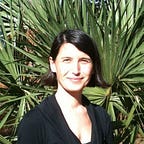Why eco-friendly solutions?
A tragic accident happened in Chernobyl, Ukraine, a far away country. But it had a dramatic effect on our food, land, and lives then and years to come. At that time, I was a kid and did not think of it much except that it was a very sad accident in Chernobyl. It didn’t affect me. However, scientists predicted that the radioactivity would come with the clouds where I lived, come down in the rain, and contaminate our soil and food. They also predicted that 10 to 15 years later cancer incidents would increase. Yes, the radioactivity did come with the clouds, rained on our land, and contaminated our food. Our crops took it, and the radiation accumulated in the leaves, fruits, and nuts. We couldn’t sell our crops because of the radioactive contamination. The scientists were right that year.
They were also right about cancer. Within 10 years, my grandmother was diagnosed with cancer. Luckily she was diagnosed early and survived. My uncle, 40 years old, was not that lucky. He passed away 6 months after the diagnosis. Many other friends and family members were also diagnosed with cancer.
This is like listening to an ecology lecture about the water cycle and using radioactivity to trace where the water goes. Water evaporates from the surface or is transpired through plants, it condenses in the air and precipitates at a different location. Then it percolates through the soil, gets into the groundwater and the oceans or large water bodies. Then the cycle goes on. Of course, there was one big difference, I was not a passive student listening to a lecture. I was in the story with the other people and real consequences.
Growing up on a farm provided more examples of the water cycle; pesticides. Pesticides were used to control insects in the family farm because pest control increased yield. I grew up with many stories about hardship and food shortages. I was told I was lucky to be born with plenty to eat. My grandfather used to talk about how pesticides improved yields and created food abundance, which made everyone's life better. So, I was well aware of the difference pesticides made. Pesticides were sprayed on the trees as a preventative measure. When it rained, it was washed off the leaves and fruits and ended up in the soil. You know the rest of the story. As time passed, I grew up and learned about the adverse effect of synthetic chemical pesticides on our environment and health. I was not the only one. So, we all realized that the feast came with a cost.
Like the consumers, my farming family and friends also want to have safe, eco-friendly alternatives for our food. Fortunately, we have safe and eco-friendly alternatives that work in harmony with Nature. We can all co-exist; insects, nematodes, fungi, bacteria, plants, animals, and humans. The use and production of biocontrol agents require a lot more sophistication. It requires the collaboration of the next generation farmers, consumers, agrichemical companies and biopesticide companies to make eco-friendly, sustainable solutions for agriculture successful.
Author: Dr. Fatma Kaplan is an accomplished scientist with experience in biology and chemistry. She discovered the first sex pheromone of the nematode Caenorhabditis elegans and published it in Nature. Dr. Kaplan believes that nematode pheromone technology will provide effective, nontoxic pest control for farmers, growers, and homeowners. Dr. Kaplan co-founded Pheronym to bring nematode technology to the market.
